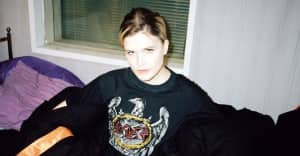Meet Kablam, The Swedish Producer Soundtracking Political Frustration
In this week’s GEN F, the spirited Janus resident finds strength in creative expression.

Between the ages of 13 and 16, Kajsa Blom was always angry. The Swedish producer, who is now 28 and records under the playful, portmanteau-ish name Kablam, had good reason beyond the usual teenage angst. The tiny village she grew up in outside of the coastal city of Gothenburg was home to many nationalists and a few neo-Nazis. While neighbors didn’t tell each other who they supported—“There’s this general culture in Sweden of not really talking about politics,” Blom tells me via Skype from her studio apartment in Stockholm—kids at school often spilled inherited rhetoric that pushed her buttons. She was always ready to debate, both with her fellow students, and, one time, with a biology teacher who tried to teach her class that abortion was murder.
Outside of school, she poured her frustration into a local band she’d joined, a more appropriate vessel than the classical piano she’d been learning by ear from the age of six. Her 13-year-old self thought they were making indie rock, but listening back recently, she realized it was “really punk. I'm just scream-singing and playing guitar.” One of the first songs she wrote was called “Capitalism Never Did Us Any Good,” and her lyrics were often “super feminist.” “The same opinions I have now,” Blom says, a smile creeping into her voice. “Of course, I got a lot of opinions from my parents but I was more radical, always.” Today, however, she embeds her politics in confrontational club music. This June, Janus—the Berlin-born collective she’s part of along with producers Lotic and M.E.S.H., and founder/labelhead Dan DeNorch—will release her debut record, Furiosa. She named it after the fearless female lead in last summer’s apocalyptic blockbuster, Mad Max: Fury Road, which she sees as “a story of sisterhood and female power.” Plus, Blom notes gleefully of Furiosa, “Mad Max is her sidekick.”


There are a lot of voices on Furiosa, but no intelligible lyrics. Instead, Blom uses non-verbal vocals—largely samples, but manipulated to dislodge them from their origins—that communicate a variety of emotions from confusion to exaltation, and threads them through “hardstyle kicks, some reggaeton snares, and baile funk sounds.” On “Choking,” there are time-stretched intakes of breath and fragments of scrambled speech; “Crisis” employs digitally mangled yelps that could either be war cries or exclamations of pain; and, for “Intensia,” she loops a Renaissance-esque choral sample to balance the track’s more unnerving sonic textures.
While Blom’s sense of drama has its roots in her formative years, it was also nurtured by the Janus collective. They’re all into embracing “strong emotions” in their work, she says, “both negative and positive emotions.” The foursome became friends after Blom moved to Berlin in 2012 in the wake of a breakup. Janus had started that same year, and Blom religiously attended every event until, in the summer of 2013, DeNorch asked her to DJ at one of their nights and she says that “woke something” inside of her.
Or reawakened, rather. At 16, she’d attended a nearby gymnasium—Sweden’s equivalent of senior-grade high school—for a program that focused on music but she found both her confidence and desire for actually writing songs depleted by “boys taking up all the space.” Discouraged, she ended up flitting through a handful of jobs before going to university to study art history, initially, before getting a degree in philosophy. The latter, which she partly completed in Berlin through distance learning, led her to the work of Hannah Arendt, a German-born political theorist in the mid-20th century, who believed diversity and plurality are crucial to freedom. Blom’s introduction to Arendt coincided with two things: her frustration with the rise of the Sweden Democrats, a right-wing political party she describes as “fascist,” and her re-interest in making music, which was prompted by teaching herself how to create edits of tracks to play in her DJ sets.

“When I DJ and when I produce, I play around with conceptions about how things are supposed to be,” Blom says of her process today. “The worst kind of music is the kind that doesn't affect me at all. I'd rather listen to something really awful—something that makes me feel disgust—than listen to some really plain house music, for instance. I can't stand that because it's just like, I don't feel anything.”
Last year, Blom moved back to Sweden and now shares a tiny studio apartment with a new partner on the “hip or whatever” island of Södermalm in Stockholm. While she regularly flies to Berlin and beyond for Janus events, she’s happy to be carving out a space for herself on her home turf. A new collective of women and non-binary music and visual artists called Drömfakulteten helped her settle back in; she and the other eleven members all share a studio. “With all the knowledge here, if you have a question about anything you're doing, you can just ask anyone,” she says. Politically, there’s hope too: the feminist party Feministiskt Initiativ, while yet to break into parliament, continues to grow in popularity in Stockholm. Furiosa might’ve been a long time coming but for Blom the journey was worth every step: “That’s what so fun and amazing about making music. It’s about freedom.”

